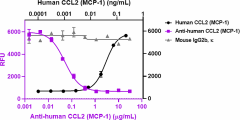- Clone
- A16052E (See other available formats)
- Regulatory Status
- RUO
- Other Names
- Monocyte chemotactic and activating factor (MCAF), monocyte secretory protein JE, small inducible cytokine A2 (SCYA2)
- Isotype
- Mouse IgG2b, κ

-

Recombinant human CCL2 (MCP-1) (Cat. No. 571406) (black circles) induces the chemotaxis of mouse Baf3-mCCR2 transfectant chemoattractant cells. Ultra-LEAF™ purified anti- human CCL2 (MCP-1) antibody (clone A16052E) (purple squares) neutralizes the chemotaxis of recombinant human CCL2 (MCP-1) on mouse Baf3-mCCR2 cells in a dose-dependent manner whereas the GoInVivo™ purified mouse IgG2b, κ isotype ctrl antibody (Cat. No. 400366) (gray triangles) does not have the effect. ND50 range: 40 - 300 ng/mL.
| Cat # | Size | Price | Quantity Check Availability | ||
|---|---|---|---|---|---|
| 943803 | 100 µg | $160.00 | |||
| 943804 | 1 mg | $715.00 | |||
Select size of product is eligible for a 40% discount! Promotion valid until December 31, 2024. Exclusions apply. To view full promotion terms and conditions or to contact your local BioLegend representative to receive a quote, visit our webpage.
CCL2, also known as MCP-1, is a member of the CC chemokine family. It is widely expressed in endothelial cells, smooth muscle cells and monocytes in response to several atherogenic stimulants such as CD40 ligand, platelet derived growth factor (PDGF), interleukin-1β (IL-1β) and oxidized low density lipoprotein. Several recent in vivo studies have disclosed critical roles of MCP-1 in atherosclerosis. In addition, MCP-1 has been implicated in monocytic infiltration of tissues during several inflammatory diseases, and has been implicated in macrophage-mediated tumor growth suppression in mice. CCL2 has been shown to have direct effects on tumor cells in an autocrine and paracrine fashion in multiple cancers, including breast, lung, cervix, ovary, sarcoma, and prostate. In addition, MCP-1 plays a key role in the regulation of MMPs during transmigration. MCP-1/CCl2 has been described as a new diagnostic marker and therapeutic target for progressive renal injury in diabetic nephropathy. Kidney epithelial cells, including glomerular podocytes and tubular cells make MCP-1 in response to high glucose and advanced glycation end products. MCP-1 promotes inflammation and progressive injury in diabetic kidneys. The importance of MCP-1 in the early development of diabetic nephropathy has been determined in animal models incorporating genetically deficient mice or therapeutic blockade of MCP-1 receptor (CCR2).
Product Details
- Verified Reactivity
- Human
- Antibody Type
- Monoclonal
- Host Species
- Mouse
- Immunogen
- Recombinant human CCL2 (MCP-1)
- Formulation
- 0.2 µm filtered in phosphate-buffered solution, pH 7.2, containing no preservative.
- Preparation
- The Ultra-LEAF™ (Low Endotoxin, Azide-Free) antibody was purified by affinity chromatography.
- Concentration
- The antibody is bottled at the concentration indicated on the vial, typically between 2 mg/mL and 3 mg/mL. Older lots may have also been bottled at 1 mg/mL. To obtain lot-specific concentration and expiration, please enter the lot number in our Certificate of Analysis online tool.
- Storage & Handling
- The antibody solution should be stored undiluted between 2°C and 8°C. This Ultra-LEAF™ solution contains no preservative; handle under aseptic conditions.
- Application
-
Neut - Quality tested
- Recommended Usage
-
Each lot of this antibody is quality control tested by neutralization of chemotaxis induced by recombinant human CCL2 (MCP-1) (Cat. No. 571406) on mouse Baf3-mCCR2 transfectant chemoattractant cells. ND50 range: 40 - 300 ng/mL. It is recommended that the reagent be titrated for optimal performance for each application.
- RRID
-
AB_2904453 (BioLegend Cat. No. 943803)
AB_2904453 (BioLegend Cat. No. 943804)
Antigen Details
- Structure
- Chemokine
- Distribution
-
MCP-1 (CCL2) is secreted by fibroblast, endothelial cells, smooth muscle cells, tumor cells, and phytohemaglutinin stimulated mononuclear cells.
- Function
- MCP-1 induces migration of monocytes, memory/activated T cells, NK cells, myeloid dendritic cells, neutrophils, astrocytes, mesangial cells, and bone marrow endothelial cells. MCP-1 is induced by IL-1ß, TNF, IFNγ, PDGF, IL-4, MIF, and IL-17.
- Interaction
- Monocytes, memory/activated T cells, NK cells, myeloid dendritic cells, neutrophils, astrocytes, mesangial cells, and bone marrow endothelial cells
- Ligand/Receptor
- MCP-1 mediates its cellular effects primarily through CCR2 receptor.
- Cell Type
- Astrocytes, Endothelial cells, Fibroblasts, Hematopoietic stem and progenitors, Monocytes
- Biology Area
- Cell Biology, Neurodegeneration, Neuroinflammation, Neuroscience, Stem Cells
- Molecular Family
- Cytokines/Chemokines
- Antigen References
-
- Loberg RD, et al. 2007. Cancer Research. 67:9417-9424.
- Gregory JL, et al. 2006. J Immunol. 177:8072-8079.
- Qui Z, et al. 2009. Immunology. 214:835-842.
- Reichel CA, et al. 2009. Arterioscler Thromb Vasc Biol. 109: 193268
- McQuibban GA, et al. 2002. Blood. 100:1160-1167
- Tesh GH, et al. 2008. Amm J Physiol Renal Physiol. 294:F697-F701.
- Gene ID
- 6347 View all products for this Gene ID
- UniProt
- View information about CCL2 on UniProt.org
Other Formats
View All CCL2 Reagents Request Custom Conjugation| Description | Clone | Applications |
|---|---|---|
| Ultra-LEAF™ Purified anti-human CCL2 (MCP-1) | A16052E | Neut |
Compare Data Across All Formats
This data display is provided for general comparisons between formats.
Your actual data may vary due to variations in samples, target cells, instruments and their settings, staining conditions, and other factors.
If you need assistance with selecting the best format contact our expert technical support team.
-
Ultra-LEAF™ Purified anti-human CCL2 (MCP-1)

Recombinant human CCL2 (MCP-1) (Cat. No. 571406) (black circ...
